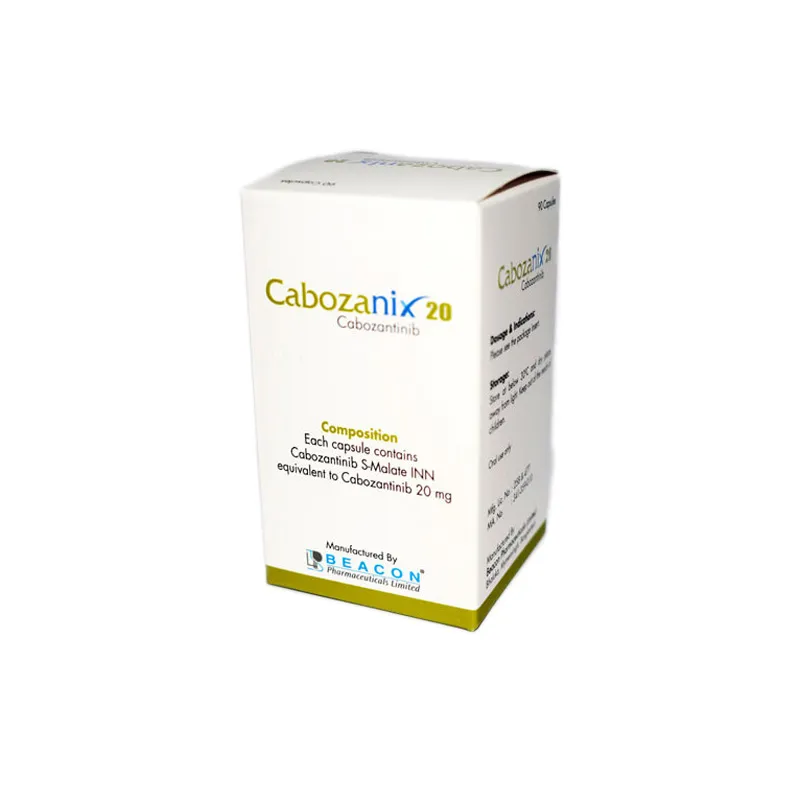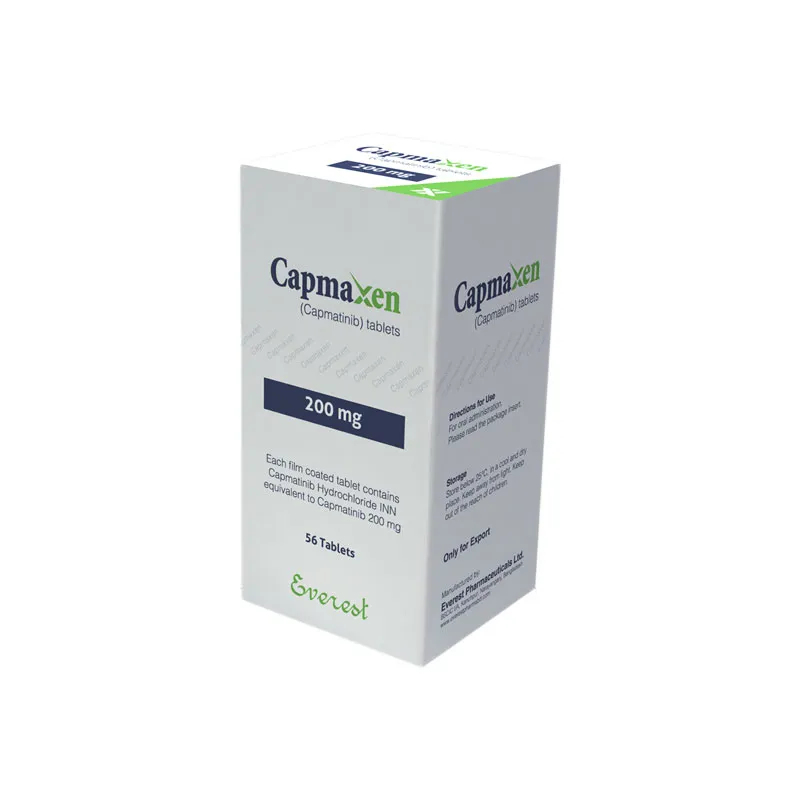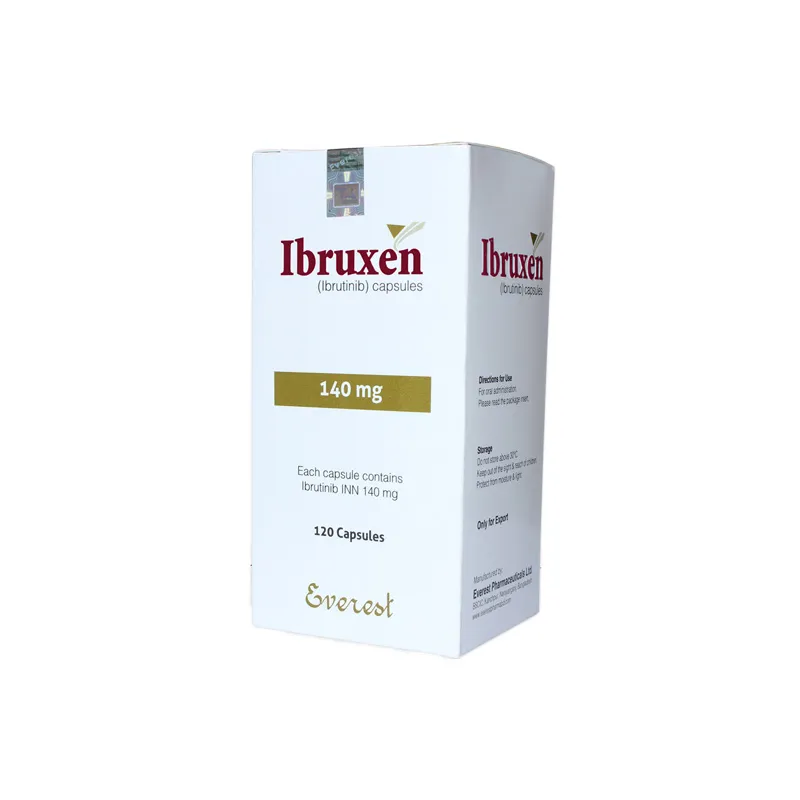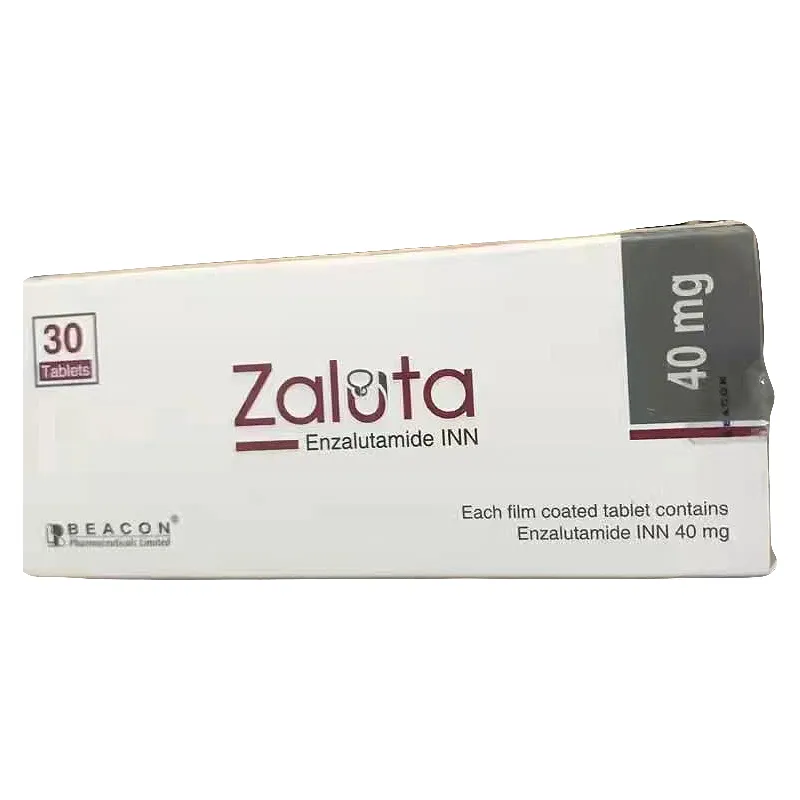Buy Cabozanix 20 Mg Online
Inquire NowTable of Contents
ToggleWhat is cabozanix (cabozantinib)?
Cabozanix is the generic version of Cometriq/Cabometyx which is also known as Cabozantinib. It is used:
- to treat advanced renal cell carcinoma (RCC; a type of cancer that begins in the cells of the kidneys).
- in combination with nivolumab (Opdivo) to treat advanced RCC in patients who have not yet received a treatment for RCC.
- to treat hepatocellular carcinoma (HCC; a type of liver cancer) in people who were previously treated with sorafenib.
- to treat a certain type of thyroid cancer in adults and children 12 years of age and older that has spread to nearby tissues or to other parts of the body and that has not responded to previous a treatment and cannot be treated with radioactive iodine.
Cabozantinib is in a class of medications called kinase inhibitors. It works by blocking the action of an abnormal protein that signals cancer cells to multiply. This helps slow or stop the spread of cancer cells. To known more about Cabozantinib visit MedlinePlus.
Why should you buy the generic cabozanix online?
First of all generic cabozanix is very affordable version of cabozantinib for thyroid cancer patients. It is a verified generic version of Cometriq/Cabometyx. Beacon pharmaceuticals Limited manufacture this generic version in Bangladesh. It is one of the renowned pharmaceutical companies who mostly made cancer medicine in Bangladesh. After the Directorate General of Drug Administration of Bangladesh approves to manufacture cabozantinib, they started to make it and sell it all over the world where generic medicine is allowed to use. It is the first generic version of Cometriq/Cabometyx which is selling regularly all over the world. It is also 89% cheaper than the brand version of Cabozantinib. Which cost you less than 1000 dollars. For thyroid cancer lenvatinib medicine also use.
COMPOSITIONS
Cabozanix 20 Capsule: Each hard gelatin capsule contains Cabozantinib (S)-Malate equivalent to 20 mg Cabozantinib.
Cabozanix 80 Capsule: Each hard gelatin capsule contains Cabozantinib (S)-Malate equivalent to 80 mg Cabozantinib.
THERAPEUTIC CLASS:
Anti-cancer
CLINICAL PHARMACOLOGY OF CABOZANIX
Mechanism of Action:
In vitro biochemical and/or cellular assays have shown that Cabozantinib inhibits the tyrosine kinase activity of RET, MET, VEGFR-1, -2 and -3, KIT, TRKB, FLT-3, AXL, ROS1, TYRO3, MER, and TIE-2. These receptor tyrosine kinases are involved in both normal cellular function and pathologic processes such as oncogenesis, metastasis, tumor angiogenesis, drug resistance, and maintenance of the tumor microenvironment.
INDICATIONS
Cabozantinib is indicated for the treatment of patients with progressive, metastatic medullary thyroid cancer (MTC).
Dosage And Administration
Recommended Dose
Do NOT substitute Cabozantinib capsules with Cabozantinib tablets. The recommended daily dose of Cabozantinib is 140 mg (one 80-mg and three 20-mg capsules). Do not administer Cabozantinib with food. Instruct patients not to eat for at least 2 hours before and at least 1 hour after taking Cabozantinib. Continue treatment until disease progression or unacceptable toxicity occurs.
Swallow Cabozantinib capsules whole. Do not open Cabozantinib capsules.
Do not take a missed dose within 12 hours of the next dose.
Do not ingest foods (e.g., grapefruit, grapefruit juice) or nutritional supplements that are known to inhibit cytochrome P450 while taking Cabozantinib.
In Patients with Hepatic Impairment: The recommended starting dose of Cabozantinib for patients with mild to moderate hepatic impairment is 80 mg.
Dosage Modifications:
For Adverse Reactions
Withhold Cabozantinib for NCI CTCAE Grade 4 hematologic adverse reactions, Grade 3 or greater non-hematologic adverse reactions or intolerable Grade 2 adverse reactions. Upon resolution/improvement of the adverse reaction (i.e., return to baseline or resolution to Grade 1), reduce the dose as follows:
• If previously receiving 140 mg daily dose, resume treatment at 100 mg daily (one 80-mg and one 20- mg capsule)
• If previously receiving 100 mg daily dose, resume treatment at 60 mg daily (three 20-mg capsules)
• If previously receiving 60 mg daily dose, resume at 60 mg if tolerated, otherwise, discontinue Cabozantinib. Permanently discontinue Cabozantinib for any of the following:
• Development of visceral perforation or fistula formation
• Severe hemorrhage
• Serious arterial thromboembolic event (e.g., myocardial infarction, cerebral infarction)
• Nephrotic syndrome
• Malignant hypertension, hypertensive crisis, persistent uncontrolled hypertension despite optimal medical management
• Osteonecrosis of the jaw
• Reversible posterior leukoencephalopathy syndrome.
In Patients Concurrently Taking a Strong CYP3A4 Inhibitor
Reduce the daily Cabozantinib dose by 40 mg (for example, from 140 mg to 100 mg daily or from 100 mg to 60 mg daily). Resume the dose that was used prior to initiating the CYP3A4 inhibitor 2 to 3 days after discontinuation of the strong inhibitor.
In Patients Concurrently Taking a Strong CYP3A4 Inducer
Increase the daily Cabozantinib dose by 40 mg (for example, from 140 mg to 180 mg daily or from 100 mg to 140 mg daily) as tolerated. Resume the dose that was used prior to initiating the CYP3A4 inducer 2 to 3 days after discontinuation of the strong inducer. The daily dose of Cabozantinib should not exceed 180 mg.
USE IN SPECIFIC POPULATIONS
Pregnancy
Based on findings from animal studies and its mechanism of action, Cabozantinib can cause fetal harm when administered to a pregnant woman. There are no available data in pregnant women to inform the drug-associated risk. In animal developmental and reproductive toxicology studies administration of Cabozantinib to pregnant rats and rabbits during organogenesis resulted in embryofetal lethality and structural anomalies at exposures that were below those occurring clinically at the recommended dose. Advise pregnant women or women of childbearing potential of the potential hazard to a fetus. The estimated background risk of major birth defects and miscarriage for the indicated population is unknown.
Lactation
There is no information regarding the presence of Cabozantinib or its metabolites in human milk, or their effects on the breastfed infant, or milk production. Because of the potential for serious adverse reactions in a breastfed infant from Cabozantinib, advise a lactating woman not to breastfeed during treatment with Cabozantinib and for 4 months after the final dose.
Females and Males of Reproductive Potential
Contraception
Females
Cabozantinib can cause fetal harm when administered to a pregnant woman. Advise females of reproductive potential to use effective contraception during treatment with Cabozantinib and for 4 months after the final dose.
Infertility
Females and Males
Based on findings in animals, Cabozantinib may impair fertility in females and males of reproductive potential.
Pediatric Use
The safety and effectiveness of Cabozantinib in pediatric patients have not been studied.
Geriatric Use
Clinical studies of Cabozantinib did not include sufficient numbers of patients aged 65 years and over to determine whether they respond differently from younger patients.
Hepatic Impairment
Increased exposure to Cabozantinib has been observed in patients with mild to moderate hepatic impairment. Reduce the starting dose of Cabozantinib in patients with mild (Child-Pugh score (C-P) A) or moderate (C-P B) hepatic impairment. Cabozantinib is not recommended for use in patients with severe hepatic impairment.
Renal Impairment
Dosage adjustment is not required in patients with mild or moderate renal impairment. There is no experience with Cabozantinib in patients with severe renal impairment.
CONTRAINDICATIONS
None
WARNINGS AND PRECAUTIONS
• Thrombotic Events: Discontinue Cabozantinib for myocardial infarction, cerebral infarction, or other serious arterial thromboembolic events.
• Wound Complications: Withhold Cabozantinib for dehiscence or complications requiring medical intervention.
• Hypertension: Monitor blood pressure regularly. Discontinue Cabozantinib for hypertensive crisis.
• Osteonecrosis of the jaw: Discontinue Cabozantinib.
• Palmar-plantar Erythrodysesthesia Syndrome (PPES): Interrupt Cabozantinib, decrease dose.
• Proteinuria: Monitor urine protein. Discontinue for nephrotic syndrome.
• Reversible posterior leukoencephalopathy syndrome (RPLS): Discontinue Cabozantinib.
• Embryo-Fetal Toxicity: Can cause fetal harm. Advise females of reproductive potential of the potential risk to a fetus and to use effective contraception.
ADVERSE REACTIONS
The most commonly reported adverse drug reactions (>_25%) are diarrhea, stomatitis, Palmar-plantar Erythrodysesthesia Syndrome (PPES), decreased weight, decreased appetite, nausea, fatigue, oral pain, hair color changes, dysgeusia, hypertension, abdominal pain, and constipation. The most common laboratory abnormalities (>_25%) are increased AST, increased ALT, lymphopenia, increased alkaline phosphatase, hypocalcemia, neutropenia, thrombocytopenia, hypophosphatemia, and hyperbilirubinemia.
DRUG INTERACTIONS
Effect of CYP3A4 Inhibitors
Administration of a strong CYP3A4 inhibitor, Ketoconazole to healthy subjects increased single dose plasma Cabozantinib exposure by 38%. Avoid taking a strong CYP3A4 inhibitor (e.g., Ketoconazole, Itraconazole, Clarithromycin, Atazanavir, Indinavir, Nefazodone, Nelfinavir, Ritonavir, Saquinavir, Telithromycin, Voriconazole) while taking Cabozantinib or reduce the dosage of Cabozantinib if concomitant use with strong CYP3A4 inhibitors cannot be avoided.
Avoid ingestion of foods (e.g., grapefruit, grapefruit juice) or nutritional supplements that are known to inhibit cytochrome P450 while taking Cabozantinib.
Effect of CYP3A4 Inducers
Administration of a strong CYP3A4 inducer, Rifampin to healthy subjects decreased single-dose plasma Cabozantinib exposure by 77%. Avoid chronic co-administration of strong CYP3A4 inducers (e.g., Phenytoin, Carbamazepine, Rifampin, Rifabutin, Rifapentine, Phenobarbital, St. John’s Wort) with Cabozantinib or increase the dosage of Cabozantinib if concomitant use with strong CYP3A4 inducers cannot be avoided.
Effect of MRP2 Inhibitors
Concomitant administration of MRP2 inhibitors may increase the exposure to Cabozantinib. Monitor patients for increased toxicity when MRP2 inhibitors (e.g., Abacavir, Adefovir, Cidofovir, Furosemide, Lamivudine, Nevirapine, Ritonavir, Probenecid, Saquinavir, and Tenofovir) are co-administered with Cabozantinib.
PHARMACEUTICAL INFORMATION
Storage conditions
Store at below 30°C and dry place, away from light. Keep out of the reach of children.
Presentation & Packaging
Cabozanix 20 Capsule: Each commercial box contains 90 Capsules in HDPE pot.
Cabozanix 60 Capsule: Each commercial box contains 30 Capsules in HDPE pot.
Cabozanix 80 Capsule: Each commercial box contains 30 Capsules in HDPE pot.
Buy Cabozanix 20 Mg Online
Are you interested to buy cabozanix 20 mg online? or you need 60 mg and 80 mg version? Don’t worry. 100 Meds can help you to find reliable and verified medicine at affordable cost. Please contact our support team by using email, whatsapp or wechat. Even you can contact our facebook page.
You must be logged in to post a review.







Reviews
There are no reviews yet.